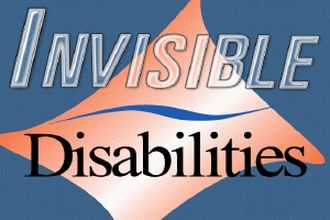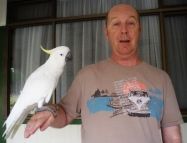
Publisher:
Bonnie King
CONTACT:
Newsroom@Salem-news.com
Advertising:
Adsales@Salem-news.com

~Truth~
~Justice~
~Peace~
TJP
May-02-2010 19:04

 TweetFollow @OregonNews
TweetFollow @OregonNews
Invisible Disability
David Bedworth Salem-News.com“. . . a bad day is when I lie in the bed and I think of things that might have been” -from a Paul Simon song
 Courtesy: webring.com and livingwithcfs.files.wordpress.com |
(ST. PETERSBURG, Florida ) - I write this article as an attempt to raise the awareness of a medical fact. There are those among us who suffer invisible disability and, as such, seem to ghost through life without being useful members of our busy society. In fact, they seem to have gotten away with the chores of life and could be seen to be slacking off or avoiding responsibility.
I am one of these people with invisible disability. I do not have a missing limb. I am not in a wheel chair. Instead I do have a golf ball sized hole in the right frontal lobe of my brain.
Surgery and treatment has left me in a disabled condition, officially recognized by the Federal Government. Yet, I can walk, talk and chew gum – which is where all of the trouble starts. If I can do these three things then I should be able to work, run, and leap smallish buildings in a bound and a half. The reality is, however, that the damage from surgery and treatment restricts my ability to do certain things.
While I am aware of these limits because of diminished neurological capacity, the average person observing my actions would not realize the internal neurological conflict that limits normal interactions with life. A recent visit to family members overseas created an atmosphere of confusion as to what was really wrong with me. Other friends and family have failed to see the damage and therefore do not understand the limits that govern my life.

At first, I thought that I was the only invisibly disabled person suffering from a lack of understanding by others. But a talk with my friend Anna in the UK (who suffers from vertigo) revealed a commonality in people’s reaction to our invisible disability. Some people in Anna’s life do not understand why she cannot drive.
After all, she only has this balance thing going on so why not jump in the car and come down to the pub? Anna’s reality is much like mine. Neurological limits (invisible to those outside our bodies) prevent us from driving, climbing ladders, completing sentences, etc.
We are of the opinion that there are some people who do not understand but that there is a certain element who do not want to understand because they cannot see the disability. Anna and I feel that we are perceived as charlatans by these people, like some sort of medieval conjurors who have taken a magic elixir in order to avoid responsibility and live off medical pensions.
Then, a few nights ago at a restaurant, I met a lady who is recovering from the ravages of ovarian cancer. She too has an invisible disability as a result of treatment. She too has friends and family who have an odd perception on her illness. She identified immediately with the experiences of both Anna and I.
Her fatigue and low morale is sometimes seen as an excuse to not participate in life. Her whole demeanor changed as we talked about invisible disability and I could she was strongly identifying with the scenarios I described to her from my own life.
It is a sad comment on our society that certain people do not understand a disability that cannot be seen or readily identified.
There are times when Anna and I feel that we have a stigma because we do not fit into the neat cookie cutter perception of a “real” disability. People who have made a miraculous recovery from illness, like Lance Armstrong, have not helped.
Lance was able to endure a remarkable recovery from his cancer and went on to accomplish astounding results in both life and cycling career. It is depressing to have the Lance scenario used as a comparison to our own slow, arduous battle with the internal damages wrought upon our bodies.


I was actually told recently:
“Look at what Lance Armstrong did. He had brain cancer as well you know.”
A neighbor recently had a recurrence of metastasized breast cancer. She too has endured a lack of understanding by family. She too has had the Lance Armstrong situation used as a comparison to her own disability.
As she now fights this recurrence with chemotherapy, she too faces the invisible disability syndrome and the attendant innuendo and societal prejudice.
And then there is another kind lady in my life who has become a good friend through my writing experience. She suffers from chronic PTSD. She avoids stress and worries about people finding out about her illness as it is not taken seriously. Her invisible illness has its own twists and turns but again parallels the experiences of those discussed in this article.
To those who do not understand or do not want to understand the life of those of us with invisible disability, I would like to leave you with the words of a Paul Simon song:
“. . . a bad day is when I lie in the bed and I think of things that might have been.”
=========================================
 Salem-News.com has a wide variety of contributing writers, but the most common thread may be issues related to veterans, and specifically, issues related to the Marine Corps. David Bedworth was the tenth former Marine to join the Salem-News.com writing team, and we are happy to welcome this former Lieutenant Colonel to our ranks. A disabling encounter with prostate and brain cancer have put David in a situation where he cannot work and has limited abilities as a result of treatment. However, brain surgery seems to have stimulated a long dormant creative surge in literature, music and poetry.
Salem-News.com has a wide variety of contributing writers, but the most common thread may be issues related to veterans, and specifically, issues related to the Marine Corps. David Bedworth was the tenth former Marine to join the Salem-News.com writing team, and we are happy to welcome this former Lieutenant Colonel to our ranks. A disabling encounter with prostate and brain cancer have put David in a situation where he cannot work and has limited abilities as a result of treatment. However, brain surgery seems to have stimulated a long dormant creative surge in literature, music and poetry.
Dave is monitoring a number of ill veterans and family members who were exposed to contaminants at the Marine Corps Base at Camp Lejeune, North Carolina. This is a subject that Salem-News.com has paid serious attention to for years, that we are increasing our coverage of at this point. Dave's joining our team will amplify our ability to pay more attention to Camp Lejeune, since our writers have concentrated primarily on exposing the contamination at MCAS El Toro, and we could not be more happy about it. You can write to Dave Bedworth at: bedworth53@gmail.com
Articles for May 1, 2010 | Articles for May 2, 2010 | Articles for May 3, 2010
Quick Links
DINING
Willamette UniversityGoudy Commons Cafe
Dine on the Queen
Willamette Queen Sternwheeler
MUST SEE SALEM
Oregon Capitol ToursCapitol History Gateway
Willamette River Ride
Willamette Queen Sternwheeler
Historic Home Tours:
Deepwood Museum
The Bush House
Gaiety Hollow Garden
AUCTIONS - APPRAISALS
Auction Masters & AppraisalsCONSTRUCTION SERVICES
Roofing and ContractingSheridan, Ore.
ONLINE SHOPPING
Special Occasion DressesAdvertise with Salem-News
Contact:AdSales@Salem-News.com

googlec507860f6901db00.html



Terms of Service | Privacy Policy
All comments and messages are approved by people and self promotional links or unacceptable comments are denied.
Ashley Boynes May 13, 2010 5:06 pm (Pacific time)
This is a poignant and much-needed article. I try to create awareness of this sort all of the time through the blog I write. I am 26 but have had Rheumatoid Arthritis in most of my joints since age 10. Since then I've dealt with many other ailments ranging from temporary/visible (Bell's Palsy) to other chronic and lifelong ones that are 'invisible' such as unresponsive celiac disease, chronic daily migraines, other strange neurological symptoms, and now adrenal insufficiency. Other than sometimes looking very tired and fatigued, and having a slight limp from a bad knee, and fluctuating weight, no one would know that anything is wrong with me other than the fact that I talk very openly about it. I do not "appear" to be sick or disabled but am often suffering greatly. More awareness needs to be spread on invisible illnesses especially those that are disabling and debilitating. For the invisible types of diseases can leave us feeling isolated and alone! Thanks for this great post!
Lisa Copen May 13, 2010 1:48 pm (Pacific time)
I'd like to see invisible illness as an invisible disabilities acknowledged. I have lived with rheumatoid arthritis is the age of 24, nearly 18 years now. I'm also the founder of National Invisible Chronic Illness Awareness Week at www.invisibleillness.com we have arthritis statistics, articles, and more ways to connect people to one another. I hope that we can follow up as I was left to connect with you to be able to further our cause and creating more awareness about invisible chronic illnesses and disabilities in the future.
Carri Anne Truchon May 4, 2010 7:19 pm (Pacific time)
I am so glad you wrote this for peoples awareness. I understand about the invisible disability - I to have disabilities that are not shown on the outside of my body - but inside it's like explosions going off. I have deformed reproductive system (my father's agent orange - I believe) - Chronic Pain, many internal issues and etc, etc - Mayo clinic calls me a medical anomoly. Don't know why I have all of these medical mysteries. I'm on 24 medications and I'm 41 yrs old and suffering with this since 29 years old. I have been on total disability since 2006 and after 20 yrs of working at same job I had to leave. Everyone always says how wonderful I look - I don't usually leave the house when I'm really bad shape but when I do go out I try to be presentable and I don't show I'm ill - why would I. People think I'm faking it so I can be on disability - I'd give anything to be well and be working. Thanks for the article to let people know that a lot of us suffer and not to ignore it.
David Rizer/dmzsgt May 3, 2010 2:43 pm (Pacific time)
This terrific article is something they should teach in Med.Schools. I am adding it to my claim with VA. THANKS an may God Bless.
Jeff Kaye~ May 3, 2010 6:07 am (Pacific time)
Great article, Dave. As a sufferer of various internal, and thus invisible, injuries myself, I can empathize with you and those few others you mentioned, and the millions of others like us. It is difficult, and in many cases impossible, for healthy individuals to accept our disabilities because we "look fine". My own doctors tell me "you look great!". Well, that's not how I feel. Isn't that what's important? How we feel? We don't have missing limbs or wheelchairs, so we should be working as hard and as efficiently as we did before, in their smug opinions. Thank you for addressing this disturbing dearth of understanding, mistreatment and stigma. I'm glad to see you on the S-N team.
gp May 2, 2010 9:13 pm (Pacific time)
This is a much needed awareness, thanks for bringing it to our attention. My sister has suffered from epilepsy her entire life and also naroclepsy, an odd combination. This causes her to have sometimes odd behavior and even some of her own family have not been understanding nor tolerant of it. It is a very difficult handicap because of the judgement others too often make regarding the afflicted person.
[Return to Top]©2025 Salem-News.com. All opinions expressed in this article are those of the author and do not necessarily reflect those of Salem-News.com.